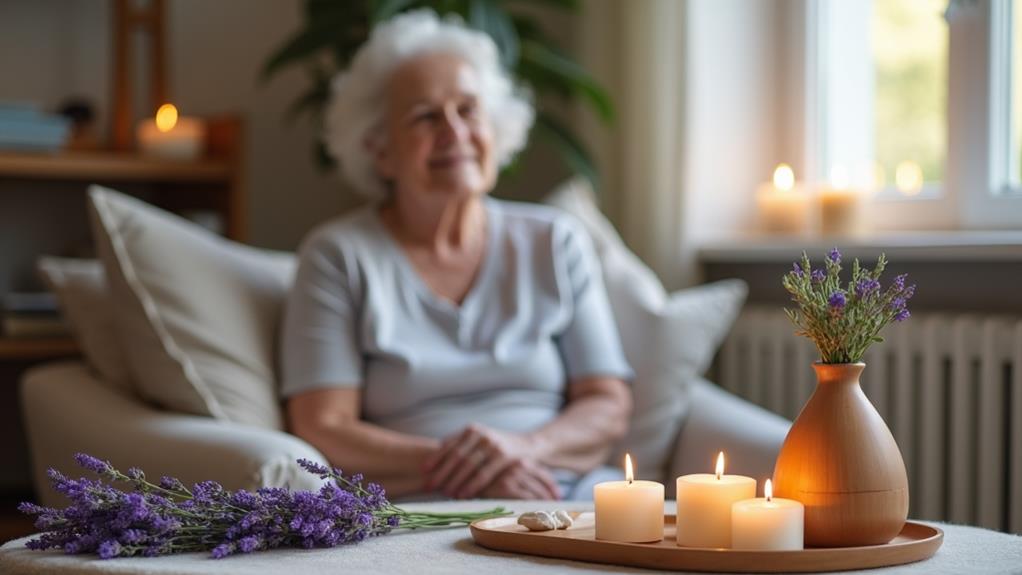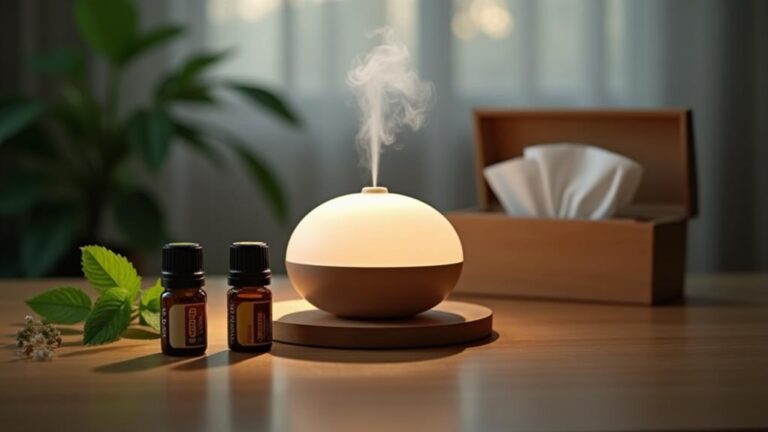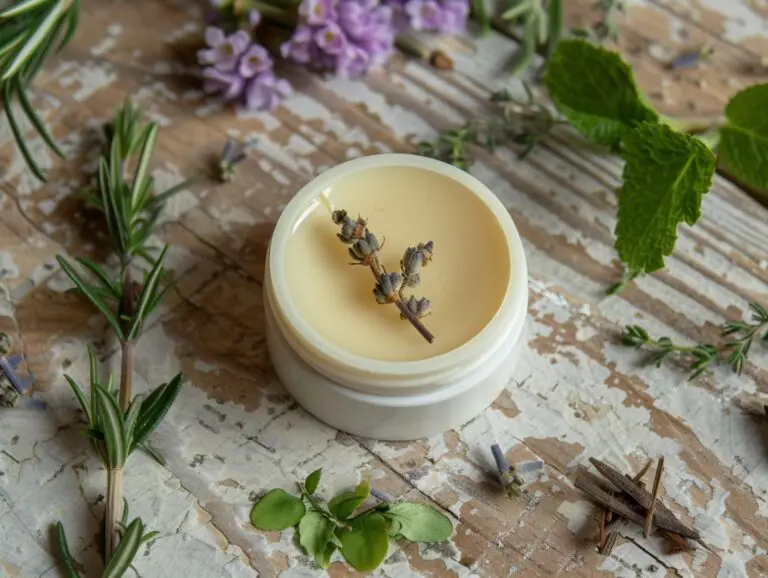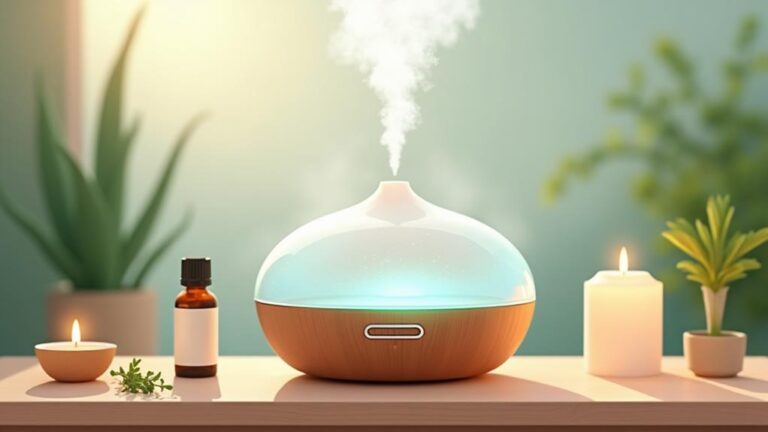As you walk through the doors of a memory care facility, the faint scent of lavender wafts through the air, transporting you to a place of serenity and calm. But is this more than just a pleasant aroma? Can the subtle yet potent power of essential oils truly make a difference in the lives of those living with dementia? You’re about to find out. Research has uncovered some remarkable benefits, from reducing agitation to improving mood, and it’s time to separate fact from fiction. What you’re about to discover might just change the way you approach dementia care forever.
Key Takeaways
- Aromatherapy reduces anxiety levels, promotes relaxation, and soothes emotional distress in individuals with dementia.
- Calming essential oils like lavender and bergamot can alleviate feelings of agitation and unease, promoting a sense of calm.
- Aromatherapy can improve mood and emotional state by reducing anxiety and stress, promoting relaxation and calm.
- Incorporating aromatherapy into daily routines can create opportunities for meaningful interactions and connections, facilitating social interaction.
- Aromatherapy has shown promise in enhancing sleep quality and duration, and stimulating the brain’s neurotransmitters, improving focus, attention, and memory.
Understanding Dementia and Its Symptoms

As the veil of forgetfulness shrouds the mind, a once-familiar world becomes increasingly foreign, and the fabric of daily life begins to unravel. You’re not alone in this struggle; millions of people worldwide are affected by dementia, a complex condition that attacks the brain’s cognitive functions.
Dementia causes a gradual decline in memory, thinking, and communication skills, making it difficult to perform daily tasks.
The progression of dementia is often categorized into seven stages, each marked by distinct symptoms. The early stages may involve mild memory loss and confusion, while later stages can lead to severe cognitive decline, agitation, and loss of motor skills.
Dementia causes can be attributed to various factors, including Alzheimer’s disease, vascular disease, and Lewy body disease. Understanding the causes and stages of dementia is vital in providing support and care to those affected.
The Science of Aromatherapy
Hundreds of essential oils, derived from plants, roots, and flowers, possess unique chemical properties that can influence our emotions, mood, and cognitive functions.
You might be surprised to learn that aromatherapy has a rich history dating back thousands of years.
The ancient Egyptians, Greeks, and Romans used essential oils for medicinal, spiritual, and emotional purposes.
In modern times, aromatherapy has evolved to incorporate a deeper understanding of essential oil chemistry.
When you inhale essential oils, the molecules travel directly to your brain, interacting with your limbic system, which regulates emotions and memory.
This complex process involves the binding of molecules to specific receptors, triggering a response that can affect your mood, cognitive function, and even physical well-being.
Understanding the chemistry behind essential oils is vital in harnessing their therapeutic potential.
Calming Effects of Essential Oils
When you’re caring for someone with dementia, you’re well aware of the anxiety and emotional distress that can come with the condition.
Essential oils can offer a gentle, non-invasive way to reduce anxiety levels, promote a relaxation response, and soothe emotional distress.
Reducing Anxiety Levels
Discover how aromatherapy can be a powerful tool in reducing anxiety levels in individuals with dementia. You may be wondering if it’s effective, and the answer is yes. Studies have shown that aromatherapy can substantially reduce anxiety in people with dementia.
The calming effects of essential oils can help alleviate feelings of agitation and unease, promoting a sense of calm and relaxation.
Many caregivers and healthcare professionals have reported positive personal experiences with aromatherapy in reducing anxiety levels in individuals with dementia.
They’ve seen firsthand how the gentle, soothing scents of essential oils can calm agitated behavior and reduce stress. The aromatherapy effectiveness is attributed to the oils’ ability to interact with the brain’s emotional centers, promoting feelings of calmness and relaxation.
Promoting Relaxation Response
How do you evoke a sense of calm in a person with dementia when they’re feeling overwhelmed or agitated? One effective way is through aromatherapy, which can promote a relaxation response by leveraging the calming effects of essential oils.
Fresh scents can transport us to a state of tranquility, and when used therapeutically, they can have a profound impact on reducing stress and anxiety in individuals with dementia.
By incorporating natural healing practices into their care, you can create a soothing atmosphere that encourages relaxation.
Some ways to promote relaxation response through aromatherapy include:
- Using calming essential oils like lavender, chamomile, and bergamot in a diffuser
- Applying gentle, soothing strokes to the skin while using calming oils
- Creating a peaceful ambiance with calming music and soft lighting
- Offering a warm bath infused with calming essential oils
- Using calming scents in massage therapy to ease muscle tension
Soothing Emotional Distress
As you work to create a calming atmosphere for individuals with dementia, you’ll find that aromatherapy can also play a vital role in soothing emotional distress. The calming effects of essential oils can help reduce anxiety, agitation, and aggression, promoting a sense of relaxation and comfort.
In turn, this can lead to improved social benefits, as individuals with dementia become more receptive to social interactions and connections. Aromatherapy can also facilitate personal growth by empowering caregivers and individuals with dementia to take control of their emotional well-being.
By incorporating aromatherapy into daily routines, you can create a more supportive and calming environment that fosters social connections and emotional resilience. This, in turn, can lead to improved overall well-being and a better quality of life for individuals with dementia.
Reducing Agitation and Aggression

In the midst of dementia’s complexities, agitation and aggression often emerge as particularly challenging symptoms, affecting not only the individual but also their caregivers and loved ones.
You may find yourself dealing with sudden outbursts, resistance to care, or even physical violence. It’s crucial to address these behaviors, as they can lead to increased stress, anxiety, and safety concerns.
Some common scenarios that may trigger agitation and aggression in individuals with dementia include:
- Overwhelming environmental stimuli, such as loud noises or bright lights
- Emotional triggers, like feeling frustrated, scared, or misunderstood
- Physical discomfort or pain
- Changes in routine or environment
- Feeling trapped or restrained
Aromatherapy can play a significant role in reducing agitation and aggression by creating a calming atmosphere, masking overwhelming environmental stimuli, and promoting relaxation.
Improving Mood and Emotional State
Frequently, individuals with dementia experience fluctuations in mood and emotional state, which can profoundly impact their quality of life and relationships with caregivers and loved ones.
As you explore ways to support your loved one, you may wonder if aromatherapy can help improve their mood and emotional state. Research suggests that certain essential oils, such as lavender and bergamot, can have a positive impact on emotional well-being. These calming scents can help reduce anxiety and stress, promoting a sense of relaxation and calm.
In addition, aromatherapy can facilitate social interaction, which is essential for maintaining personal identity and emotional connection.
By incorporating aromatherapy into daily routines, such as during activities or mealtimes, you can create opportunities for meaningful interactions and connections. This can help your loved one feel more engaged, comforted, and valued, ultimately enhancing their mood and emotional state.
Enhancing Sleep Quality and Duration
You’ve likely noticed that your loved one with dementia often struggles with sleep disturbances, which can exacerbate their condition and create challenges for caregivers.
Sleep disturbances are a common symptom of dementia, affecting up to 70% of individuals with the condition. This can disrupt their circadian rhythms, leading to daytime fatigue, agitation, and restlessness.
Some common sleep-related issues in dementia include:
- Waking up multiple times during the night
- Having difficulty falling asleep or staying asleep
- Experiencing daytime sleepiness and lethargy
- Displaying restless behavior, such as pacing or wandering, at night
- Having trouble distinguishing between day and night
Aromatherapy has shown promise in enhancing sleep quality and duration in individuals with dementia.
Boosting Cognitive Function and Memory
As caregivers, you may have witnessed your loved one with dementia struggling to recall recent events, remember familiar faces, or perform daily tasks – a heartbreaking reality that can be overwhelming for both of you.
You’re not alone in this struggle, and researchers have been exploring innovative ways to support cognitive function and memory in individuals with dementia. One such approach is aromatherapy, which has shown promising results in enhancing brain stimulation techniques.
Aromatherapy application, specifically through essential oils like peppermint, rosemary, and lavender, can stimulate the brain’s neurotransmitters, improving focus, attention, and memory.
By incorporating aromatherapy into daily routines, you can help your loved one stay engaged and mentally active. For instance, add a few drops of peppermint oil to their morning bath or use a diffuser with rosemary oil during mentally stimulating activities, such as puzzles or games.
Aromatherapy in Dementia Care Settings

In dementia care settings, incorporating aromatherapy into daily routines can have a profound impact on residents’ overall well-being. You can create a calming atmosphere, reducing agitation and anxiety, and promoting relaxation.
This, in turn, can lead to improved sleep quality, appetite, and mood.
Some ways to incorporate aromatherapy into daily care include:
- Using essential oils in bathwater or during massages to promote relaxation
- Diffusing calming scents, such as lavender or chamomile, in common areas
- Offering aromatherapy sessions as a form of sensory stimulation and engagement
- Incorporating aromatherapy into daily routines, such as during morning care or before bedtime
- Providing caregivers with aromatherapy training and support to guarantee consistency and effectiveness
Staff training is essential to guarantee that aromatherapy is used effectively and safely.
Caregiver support is also indispensable, as they play a pivotal role in implementing aromatherapy interventions and monitoring residents’ responses.
The Future of Aromatherapy Research
As you consider the future of aromatherapy research, you’ll likely explore new avenues that haven’t been thoroughly investigated yet, such as the impact of essential oils on specific dementia-related symptoms.
You’ll also see advancements in study design, like more rigorous methodologies and larger sample sizes, which will help strengthen the evidence base for aromatherapy.
These developments will likely lead to a better understanding of how aromatherapy can be used to improve the lives of individuals with dementia.
New Avenues Explored
Throughout the last decade, researchers have been paving the way for a deeper understanding of aromatherapy’s potential in dementia care, and now, new avenues are being explored.
You’re likely wondering what these new paths entail.
- Personalized aromatherapy treatments tailored to individual needs and preferences are being developed to maximize benefits.
- Researchers are investigating the effects of aromatherapy on specific dementia symptoms, such as agitation and sleep disturbances.
- The role of aromatherapy in reducing caregiver stress and enhancing caregiver support is being examined.
- Therapist training programs are being created to equip healthcare professionals with the knowledge and skills to effectively integrate aromatherapy into dementia care.
- The use of innovative technologies, such as virtual reality and mobile apps, to deliver aromatherapy interventions is being explored.
These new avenues hold promise for revealing the full potential of aromatherapy in dementia care, and you can expect to see exciting developments in the years to come.
Advancements in Study Design
The pursuit of rigorous study designs is revolutionizing the field of aromatherapy research in dementia care. You’re likely to see more clinical trials that assess the effects of aromatherapy on dementia symptoms, such as aggression, agitation, and sleep disturbances.
These trials will provide valuable insights into the efficacy of aromatherapy as a complementary therapy.
As research methodologies evolve, you can expect more sophisticated statistical modeling to analyze the data. This will help researchers identify patterns and correlations that might’ve gone unnoticed in the past.
Additionally, meta-analysis results will allow researchers to combine data from multiple studies, providing a more thorough understanding of aromatherapy’s effects.
These advancements in study design will enable researchers to pinpoint the most effective essential oils, dosages, and delivery methods.
This, in turn, will inform the development of evidence-based guidelines for aromatherapy in dementia care.
As a result, you can expect to see more confident recommendations from healthcare professionals about the use of aromatherapy as a supportive therapy for people with dementia.
Frequently Asked Questions: How Does Aromatherapy Help Dementia

Can Aromatherapy Be Used in Combination With Medication for Dementia?
You can combine aromatherapy with medication for dementia, but making this decision requires evaluating alternative treatments and consulting with a healthcare professional to guarantee safe medication timing and ideal results.
Are There Any Risks or Side Effects of Aromatherapy for Dementia Patients?
As you navigate the complex landscape of dementia care, be aware that aromatherapy, like a delicate flower, can have hidden thorns – you may encounter allergic reactions or sensitivity issues in patients, so monitor them closely and adjust treatments accordingly.
Can Caregivers or Family Members Administer Aromatherapy to Dementia Patients?
You can play a crucial role in dementia care by administering aromatherapy to your loved one, providing emotional comfort and calming effects, especially when combined with family support, which is essential for effective caregiving.
How Often Should Aromatherapy Sessions Be Conducted for Optimal Results?
You’ll be startled to know that 70% of dementia patients experience agitation daily. To minimize this, you should conduct aromatherapy sessions 2-3 times a week, with each session lasting 20-30 minutes, as consistent frequency and ideal session duration are key to maximizing calming effects.
Are There Specific Essential Oils That Should Be Avoided for Dementia Patients?
When working with dementia patients, you’ll want to avoid essential oils that can exacerbate sensory issues, such as peppermint or eucalyptus, which can be overwhelming, and also be cautious of oil interactions with medications, like blood thinners, to guarantee safe and effective care.
Conclusion
As you navigate the complex landscape of dementia care, aromatherapy emerges as a beacon of hope, illuminating a path to calmness, clarity, and connection. By harnessing the potent properties of essential oils, you can create a soothing sanctuary that eases anxiety, lifts mood, and revives memory. As the scent of serenity wafts through the air, the fog of dementia begins to lift, revealing a brighter, more compassionate future for those affected and their loved ones.














